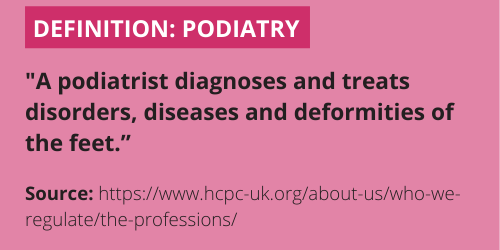
Podiatrist is a profession regulated by the Health and Care Professions Council (HCPC). The HCPC sets out the standards of proficiency which every Podiatrist must meet in order to become registered.
Podiatrists are registered healthcare professionals specialising in the lower limb (feet, ankles, legs), providing high-quality clinical care to people of all ages. Their job is to work to protect people’s feet, providing preventative advice, care, assessment, diagnosis and treatment of a range of problems affecting the lower limb. Keeping mobile and retaining independence affects the quality of people’s lives.
Podiatrists aim to reduce the impact of disability and dysfunction and have a role in rehabilitation. They play a pivotal part in reducing the risk of amputation, infection, pain, deformity and hospital admissions. They will undertake a range of podiatry interventions including wound care, routine skin and nail care, nail surgery, scalpel work or care for long term conditions. They provide musculoskeletal assessment and then instigate a treatment plan to improve or enhance movement or reduce pain. They prescribe functional insoles for the management of foot / lower limb conditions.
The following apprentice standard is approved for delivery in this area:
- Level 2 Healthcare Support Worker
- Level 3 Senior Healthcare Support Worker
- Level 5 Assistant Practitioner (Health)
- Level 6 Enhanced Clinical Practitioner
- Level 6 Podiatrist (degree) (HCPC 2022)
- Level 7 Advanced Clinical Practitioner (Degree)
Follow the links to see more about each apprenticeship including the stage of development, funding band and duration. You can also download the standard and end point assessment documents as well as checking the training providers and end point assessment organisations that may be available.
Pathways Tool
You can access our Pathways Tool here.
This tool allows you to see more about how apprentices may progress from one occupation to another.
Resources:
- IfATE Occupational Maps – Useful for exploring apprenticeships by occupational route
- Case Study: Faith Cox – Level 6 Podiatry (degree) (HCPC 2013) apprenticeship standard
- Level 6 Podiatrist (Degree) Apprenticeship – Information pack
- Level 5 Assistant Practitioner (Health) – Information pack
- Apprenticeship Costing Calculator / Planning Tools
- Enhanced Clinical Practitioner – Employer Guidance


